高一英语必修三第一单元重要知识点讲解
- 格式:doc
- 大小:73.00 KB
- 文档页数:11
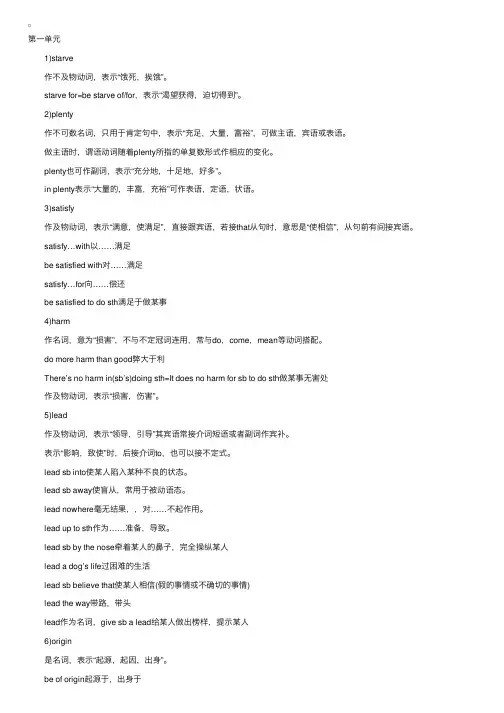
第⼀单元 1)starve 作不及物动词,表⽰“饿死,挨饿”。
starve for=be starve of/for,表⽰“渴望获得,迫切得到”。
2)plenty 作不可数名词,只⽤于肯定句中,表⽰“充⾜,⼤量,富裕”,可做主语,宾语或表语。
做主语时,谓语动词随着plenty所指的单复数形式作相应的变化。
plenty也可作副词,表⽰“充分地,⼗⾜地,好多”。
in plenty表⽰“⼤量的,丰富,充裕”可作表语,定语,状语。
3)satisfy 作及物动词,表⽰“满意,使满⾜”,直接跟宾语,若接that从句时,意思是“使相信”,从句前有间接宾语。
satisfy…with以……满⾜ be satisfied with对……满⾜ satisfy…for向……偿还 be satisfied to do sth满⾜于做某事 4)harm 作名词,意为“损害”,不与不定冠词连⽤,常与do,come,mean等动词搭配。
do more harm than good弊⼤于利 There’s no harm in(sb’s)doing sth=It does no harm for sb to do sth做某事⽆害处 作及物动词,表⽰“损害,伤害”。
5)lead 作及物动词,表⽰“领导,引导”其宾语常接介词短语或者副词作宾补。
表⽰“影响,致使”时,后接介词to,也可以接不定式。
lead sb into使某⼈陷⼊某种不良的状态。
lead sb away使盲从,常⽤于被动语态。
lead nowhere毫⽆结果,,对……不起作⽤。
lead up to sth作为……准备,导致。
lead sb by the nose牵着某⼈的⿐⼦,完全操纵某⼈ lead a dog’s life过困难的⽣活 lead sb believe that使某⼈相信(假的事情或不确切的事情) lead the way带路,带头 lead作为名词,give sb a lead给某⼈做出榜样,提⽰某⼈ 6)origin 是名词,表⽰“起源,起因,出⾝”。
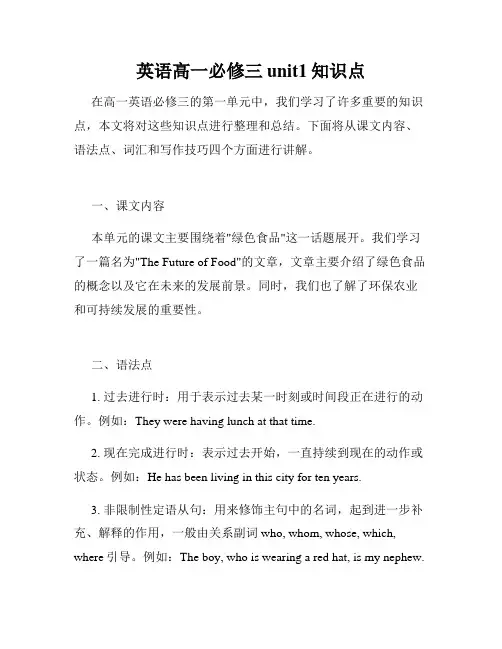
英语高一必修三unit1知识点在高一英语必修三的第一单元中,我们学习了许多重要的知识点,本文将对这些知识点进行整理和总结。
下面将从课文内容、语法点、词汇和写作技巧四个方面进行讲解。
一、课文内容本单元的课文主要围绕着"绿色食品"这一话题展开。
我们学习了一篇名为"The Future of Food"的文章,文章主要介绍了绿色食品的概念以及它在未来的发展前景。
同时,我们也了解了环保农业和可持续发展的重要性。
二、语法点1. 过去进行时:用于表示过去某一时刻或时间段正在进行的动作。
例如:They were having lunch at that time.2. 现在完成进行时:表示过去开始,一直持续到现在的动作或状态。
例如:He has been living in this city for ten years.3. 非限制性定语从句:用来修饰主句中的名词,起到进一步补充、解释的作用,一般由关系副词who, whom, whose, which, where引导。
例如:The boy, who is wearing a red hat, is my nephew.4. 由疑问词引导的特殊疑问句:包括对地点、时间、原因、方式、人物等提问。
例如:Where did you go yesterday?三、词汇1. environmental:环境的2. organic:有机的3. conventionally:传统地4. pesticide:农药5. biotechnology:生物技术6. innovation:创新四、写作技巧1. 遣词造句:在写作时,可以运用丰富多样的词汇和句型来增加文章的表达力。
可以使用形容词和副词来描述事物,运用各种连接词来展示逻辑关系。
2. 开头和结尾:开头要简洁明了地表达主题,吸引读者的注意力;结尾要提出自己的观点或总结全文内容,给读者留下深刻的印象。
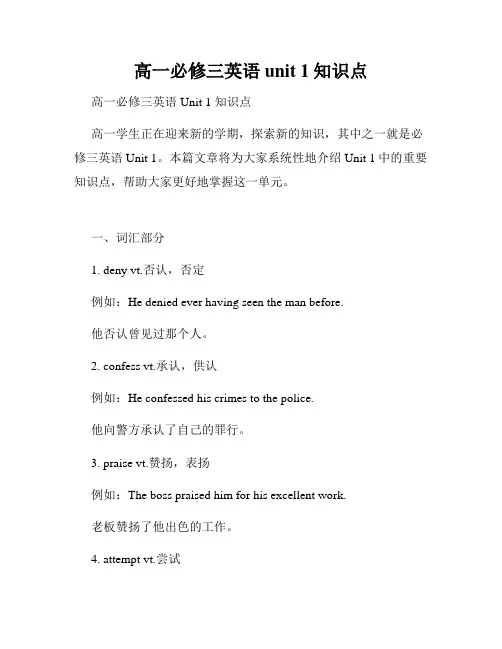
高一必修三英语unit 1知识点高一必修三英语Unit 1 知识点高一学生正在迎来新的学期,探索新的知识,其中之一就是必修三英语Unit 1。
本篇文章将为大家系统性地介绍Unit 1中的重要知识点,帮助大家更好地掌握这一单元。
一、词汇部分1. deny vt.否认,否定例如:He denied ever having seen the man before.他否认曾见过那个人。
2. confess vt.承认,供认例如:He confessed his crimes to the police.他向警方承认了自己的罪行。
3. praise vt.赞扬,表扬例如:The boss praised him for his excellent work.老板赞扬了他出色的工作。
4. attempt vt.尝试例如:He attempted to climb the mountain without any equipment.他试图不带任何装备攀登这座山。
5. hesitate vi.犹豫例如:She hesitated for a moment and then said "yes".她犹豫了一会儿,然后说“是的”。
二、从句部分1. 定语从句定语从句是修饰一个名词或代词的从句,通常使用关系代词或关系副词引导。
注意区分限制性定语从句和非限制性定语从句。
例如:The book that I borrowed from the library is very interesting.我从图书馆借的那本书非常有趣。
2. 时间状语从句时间状语从句用来表示一个动作或事件发生的时间,常用的引导词有when, while, before, after等。
例如:I will call you when I get home.我回家后会给你打电话。
3. 条件状语从句条件状语从句用来表示在某个条件下会发生的动作或事件,常用的引导词有if, unless等。
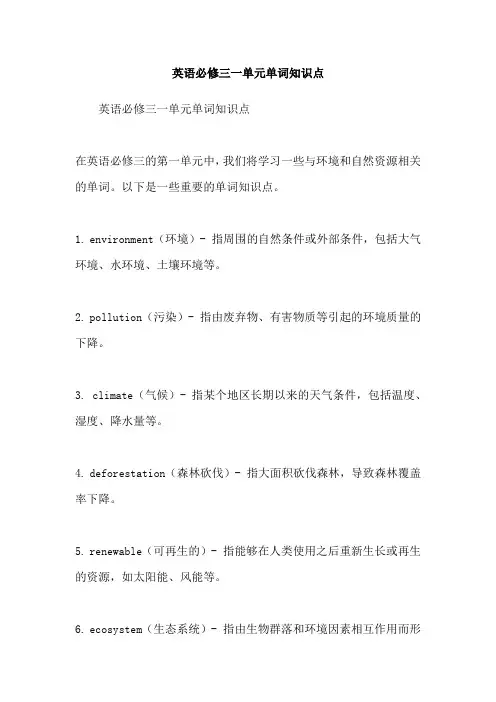
英语必修三一单元单词知识点
英语必修三一单元单词知识点
在英语必修三的第一单元中,我们将学习一些与环境和自然资源相关的单词。
以下是一些重要的单词知识点。
1. environment(环境)- 指周围的自然条件或外部条件,包括大气环境、水环境、土壤环境等。
2. pollution(污染)- 指由废弃物、有害物质等引起的环境质量的下降。
3. climate(气候)- 指某个地区长期以来的天气条件,包括温度、湿度、降水量等。
4. deforestation(森林砍伐)- 指大面积砍伐森林,导致森林覆盖率下降。
5. renewable(可再生的)- 指能够在人类使用之后重新生长或再生的资源,如太阳能、风能等。
6. ecosystem(生态系统)- 指由生物群落和环境因素相互作用而形
成的稳定系统。
7. biodiversity(生物多样性)- 指某个地区或生态系统中存在的
各种生物物种的多样性。
8. conservation(保护)- 指保护自然资源、环境等免受破坏或损害。
9. sustainable(可持续的)- 指能够满足当前需求而不影响后代满足其需求的发展方式。
10. habitat(栖息地)- 指生物种类所居住的特定环境。
在学习这些单词的同时,我们还需要了解它们的词性和正确的用法。
可以通过阅读相关文章或进行相关练习来巩固这些单词的知识。
此外,我们还可以使用这些单词来进行写作或口语练习,以帮助巩固和运用这些单词。
通过掌握这些单词,我们可以更好地理解和描述与环境和自然资源有关的话题,从而更好地保护我们的地球和可持续发展。
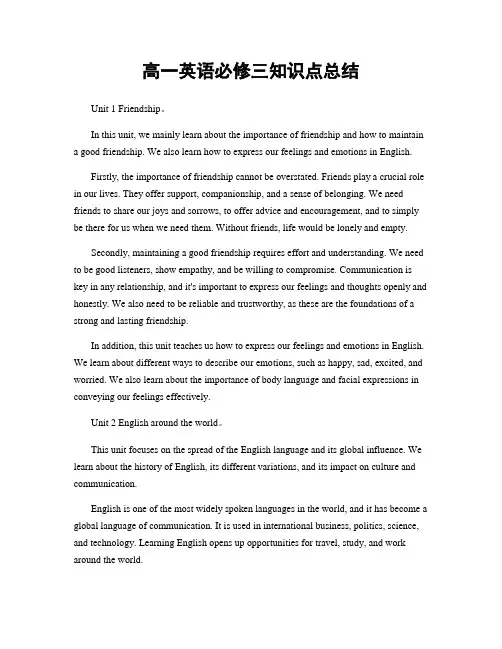
高一英语必修三知识点总结Unit 1 Friendship。
In this unit, we mainly learn about the importance of friendship and how to maintain a good friendship. We also learn how to express our feelings and emotions in English.Firstly, the importance of friendship cannot be overstated. Friends play a crucial role in our lives. They offer support, companionship, and a sense of belonging. We need friends to share our joys and sorrows, to offer advice and encouragement, and to simply be there for us when we need them. Without friends, life would be lonely and empty.Secondly, maintaining a good friendship requires effort and understanding. We need to be good listeners, show empathy, and be willing to compromise. Communication is key in any relationship, and it's important to express our feelings and thoughts openly and honestly. We also need to be reliable and trustworthy, as these are the foundations of a strong and lasting friendship.In addition, this unit teaches us how to express our feelings and emotions in English. We learn about different ways to describe our emotions, such as happy, sad, excited, and worried. We also learn about the importance of body language and facial expressions in conveying our feelings effectively.Unit 2 English around the world。

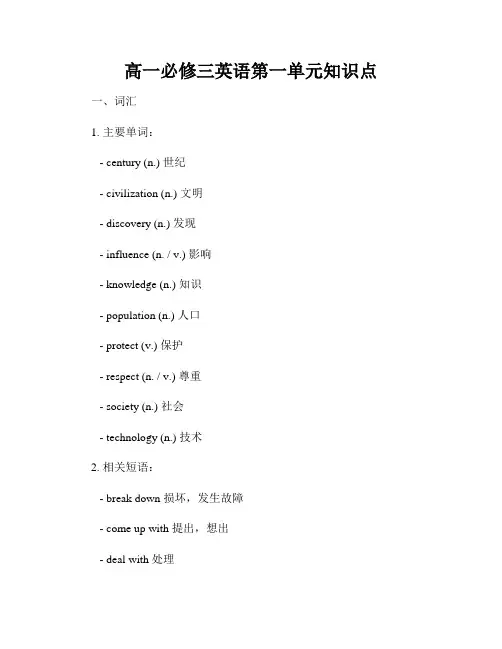
高一必修三英语第一单元知识点一、词汇1. 主要单词:- century (n.) 世纪- civilization (n.) 文明- discovery (n.) 发现- influence (n. / v.) 影响- knowledge (n.) 知识- population (n.) 人口- protect (v.) 保护- respect (n. / v.) 尊重- society (n.) 社会- technology (n.) 技术2. 相关短语:- break down 损坏,发生故障- come up with 提出,想出- deal with 处理- find out 发现,查明- look forward to 期待- make up 编造,弥补- play a role 起作用- take part in 参加- turn to 求助于二、语法1. 一般现在时:表示客观事实、日常习惯等。
- 例句:The sun rises in the east.- 例句:I usually have breakfast at 7 am.2. 时间状语从句:使用when、while、before、after等引导的从句。
- 例句:I will call you after I finish my homework.- 例句:She always listens to music while she is doing homework.3. 直接引语和间接引语:将别人的话转述为间接引语时,需要注意时态和人称的变化。
- 直接引语:He said, "I am going to the park."间接引语:He said that he was going to the park.4. 及物动词和不及物动词:不及物动词后面不接宾语,而及物动词需要接宾语。
- 例句:He plays basketball very well. (及物动词)- 例句:She runs every morning. (不及物动词)三、阅读理解1. 主旨大意题:通过阅读全文,理解文章的主要观点或中心思想。
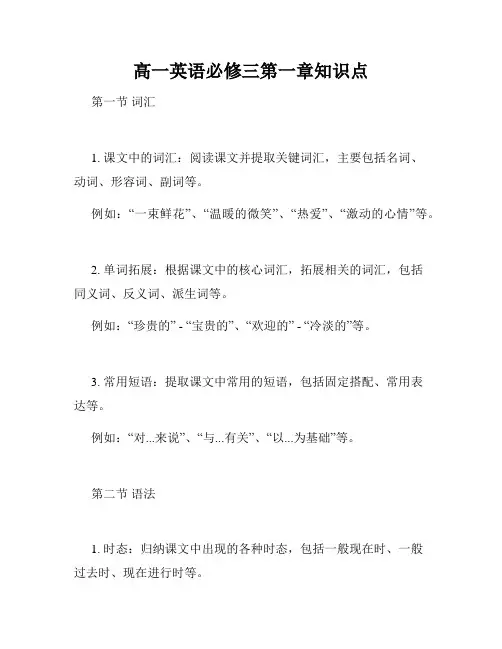
高一英语必修三第一章知识点第一节词汇1. 课文中的词汇:阅读课文并提取关键词汇,主要包括名词、动词、形容词、副词等。
例如:“一束鲜花”、“温暖的微笑”、“热爱”、“激动的心情”等。
2. 单词拓展:根据课文中的核心词汇,拓展相关的词汇,包括同义词、反义词、派生词等。
例如:“珍贵的” - “宝贵的”、“欢迎的” - “冷淡的”等。
3. 常用短语:提取课文中常用的短语,包括固定搭配、常用表达等。
例如:“对...来说”、“与...有关”、“以...为基础”等。
第二节语法1. 时态:归纳课文中出现的各种时态,包括一般现在时、一般过去时、现在进行时等。
例如:“I usually go to school by bus.”、“She wrote a letter to her friend yesterday.”等。
2. 语态:总结课文中的被动语态句型,理解主动语态和被动语态的转换规则。
例如:“The book was written by an American author.”、“Many trees have been planted in the park.”等。
3. 从句:分析课文中的主从复合句结构,包括定语从句、宾语从句、状语从句等。
例如:“The film that we watched last night was very interesting.”、“I believe that she will succeed.”等。
第三节阅读理解1. 主旨大意:归纳课文的主旨和总体内容,抓住文章的中心思想。
例如:“本课文主要讲述了环保和可持续发展的重要性,并鼓励大家参与其中。
”2. 细节信息:找出课文中的关键信息,包括人名、地名、时间、数字等。
例如:“The Green Earth Club was founded by a group of enthusiastic students in 2008.”3. 推理判断:根据课文的线索进行推理判断,分析作者的观点和意图。
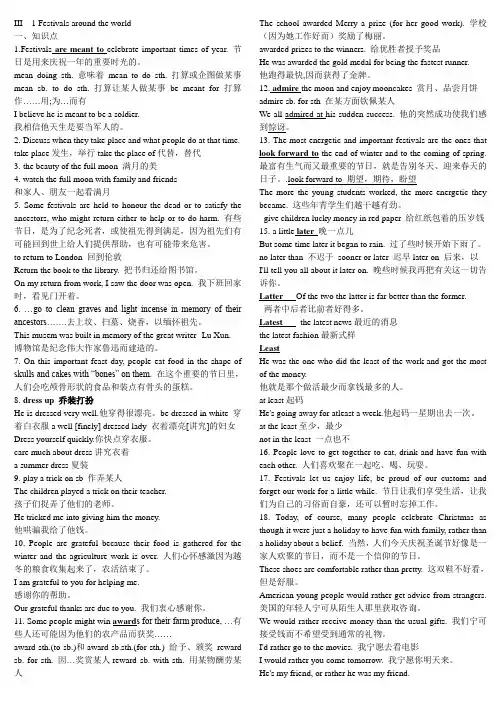
III---1 Festivals around the world一、知识点1.Festivals are meant to celebrate important times of year. 节日是用来庆祝一年的重要时光的。
mean doing sth. 意味着mean to do sth. 打算或企图做某事mean sb. to do sth. 打算让某人做某事be meant for 打算作……用;为…而有I believe he is meant to be a soldier.我相信他天生是要当军人的。
2. Discuss when they take place and what people do at that time. take place发生,举行take the place of代替,替代3. the beauty of the full moon 满月的美4. watch the full moon with family and friends和家人、朋友一起看满月5. Some festivals are held to honour the dead or to satisfy the ancestors, who might return either to help or to do harm. 有些节日,是为了纪念死者,或使祖先得到满足,因为祖先们有可能回到世上给人们提供帮助,也有可能带来危害。
to return to London 回到伦敦Return the book to the library. 把书归还给图书馆。
On my return from work, I saw the door was open. 我下班回家时,看见门开着。
6. …go to clean graves and light incense in memory of their ancestors…….去上坟、扫墓、烧香,以缅怀祖先。
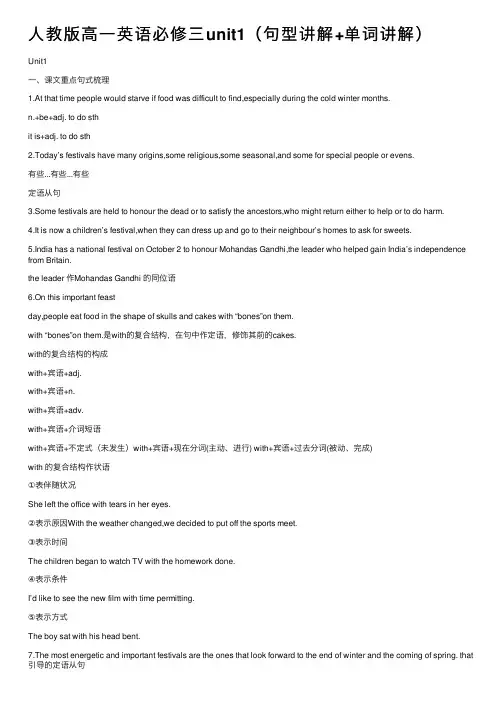
⼈教版⾼⼀英语必修三unit1(句型讲解+单词讲解)Unit1⼀、课⽂重点句式梳理1.At that time people would starve if food was difficult to find,especially during the cold winter months.n.+be+adj. to do sthit is+adj. to do sth2.Today’s festivals have many origins,some religious,some seasonal,and some for special people or evens.有些...有些...有些定语从句3.Some festivals are held to honour the dead or to satisfy the ancestors,who might return either to help or to do harm.4.It is now a children’s festival,when they can dress up and go to their neighbour’s homes to ask for sweets.5.India has a national festival on October 2 to honour Mohandas Gandhi,the leader who helped gain India’s independence from Britain.the leader 作Mohandas Gandhi 的同位语6.On this important feastday,people eat food in the shape of skulls and cakes with “bones”on them.with “bones”on them.是with的复合结构,在句中作定语,修饰其前的cakes.with的复合结构的构成with+宾语+adj.with+宾语+n.with+宾语+adv.with+宾语+介词短语with+宾语+不定式(未发⽣)with+宾语+现在分词(主动、进⾏) with+宾语+过去分词(被动、完成)with 的复合结构作状语①表伴随状况She left the office with tears in her eyes.②表⽰原因With the weather changed,we decided to put off the sports meet.③表⽰时间The children began to watch TV with the homework done.④表⽰条件I’d like to see the new film with time permitting.⑤表⽰⽅式The boy sat with his head bent.7.The most energetic and important festivals are the ones that look forward to the end of winter and the coming of spring. that 引导的定语从句8.The country,covered with cherrytree flowers,looks as though it is covered with pink snow.as though 引导的表语从句过去分词短语作后置定语9.It was obvious that the manager of the coffee shop was waiting for Li Fang to leave.it is obvious that很显然...=it is clear that=it is evident that10.Finding that Zhinu washeart-broken,her grandmother finally decide to let the couple cross the Milky Way to meet once a year.现在分词短语作状语,表原因10.People in China hope that the weather will be fine on that day,because if it is raining,it means that Zhinu is weeping and the couple won’t be able to meet. that 引导的从句⼆、句⼦背诵清单下个⽉我们学校要举⾏科技周The Science Week will take in (=will be held) our school next month.瑞雪兆丰年A timely snow promises a good harvest.⼀次成功的庆祝会a successful celebration端午节的由来the origin of the Dragon boat Festival⼀个宗教的节⽇a religious festival庆祝冬天的结束celebrate the end of the cold weather满⾜祖先satisfy the ancestors扫墓和点⾹clean graves and light incense纪念祖先in memory of the ancestors给逝去的⼈供奉⾷物和鲜花offer food and flowers to the dead 在古⽼的信念中in old beliefs头⾻形状的⾷物food in the shape of skulls 令⼈难以置信的beyond belief孩⼦们穿新⾐服children dressed in new clothes 打扮成死者的灵魂dress (sb) up as the spirits of the dead people⼀些商业技巧some tricks of business=some business tricks.骗⾛某⼈的钱trick/fool/cheat sb out of their money红包⾥的压岁钱lucky money in red paper搜集鲜花和⾷物gather flowers/food为农产品⽽获奖win/receive awards for the farm produce为他的勇敢⽽颁奖award him a prize for his bravery赏⽉吃⽉饼admire the moon and enjoy mooncakes端午节是在农历⼗五The Lantern Festival falls on the fifteenth day of the first lunar month ⼀场视觉和听觉的盛宴a feast for our eyes and ears享受⽣活,暂时忘记⼯作enjoy life and forget our work for a little while 征求某⼈的许可ask for one’s permission深深吸⼀⼝新鲜空⽓take a deep breath of fresh air 因...向...道歉apologize to sb for sth借酒消愁drown oneself in wine/drink三、词汇派⽣1.beauty n.美;美⼈beautiful adj.美丽的beautify vt.美化2.believe v.相信;信任belief n.信任;信⼼;信仰believable adj.可信的unbelievable adj.难以置信的unbelievably adv.难以置信地3.arrive vi.到达arrival n.到来;到达;到达者4.independence n.独⽴;⾃主independentadj.独⽴的;⾃主的independentlyadv.独⽴地;⾃主地;⾃⼒地5.forgive vt.原谅;饶恕forgiveness n.原谅;饶恕forgivable adj.可以宽恕(原谅)的unforgivable adj.不可原谅的四、重点单词梳理1.starvevi. & vt. (使)饿死;(使)挨饿n. starvationstarve to death 饿死starve for sth.渴望得到某物2.gain1)经过努⼒获得⾃⼰渴望的东西gain experience/fame/respect/ love/trust/confidence2). 速度,重量等的增加He gained weight.The plane gained height rapidly.3)(钟表)⾛快My watch never gains or loses.3 .in memory of为了纪念;追念。
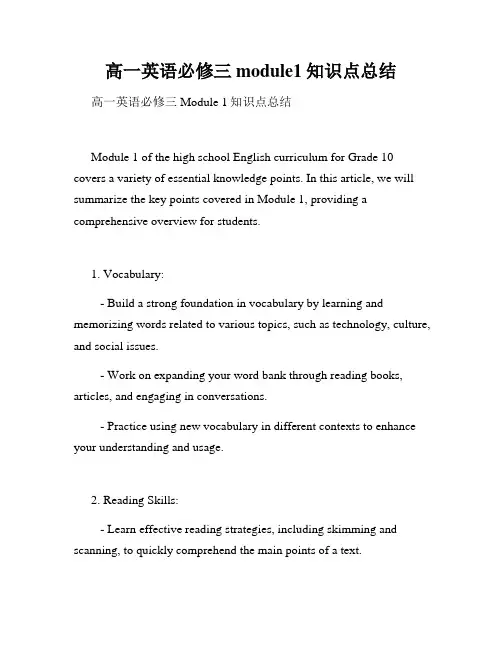
高一英语必修三module1知识点总结高一英语必修三Module 1知识点总结Module 1 of the high school English curriculum for Grade 10 covers a variety of essential knowledge points. In this article, we will summarize the key points covered in Module 1, providing a comprehensive overview for students.1. Vocabulary:- Build a strong foundation in vocabulary by learning and memorizing words related to various topics, such as technology, culture, and social issues.- Work on expanding your word bank through reading books, articles, and engaging in conversations.- Practice using new vocabulary in different contexts to enhance your understanding and usage.2. Reading Skills:- Learn effective reading strategies, including skimming and scanning, to quickly comprehend the main points of a text.- Develop the ability to infer meanings through context clues, making it easier to understand unfamiliar words or phrases.- Understand different text types and their structures, such as narrative, descriptive, and argumentative texts.3. Listening Skills:- Enhance your listening skills by regularly practicing with authentic materials, such as movies, podcasts, and recordings of native English speakers.- Focus on understanding the main ideas, supporting details, and the speaker's tone and attitude.- Take notes while listening to strengthen your ability to absorb information and remember important details.4. Speaking Skills:- Improve your ability to express yourself clearly and confidently through regular speaking practice.- Engage in conversations with classmates or English-speaking friends to develop fluency and accuracy.- Pay attention to pronunciation, stress, and intonation patterns to sound more natural.5. Writing Skills:- Master the basic elements of writing, including grammar, sentence structure, and paragraph development.- Learn different types of writing, such as essays, letters, and reports, and understand the specific requirements for each.- Revise and edit your writing to improve coherence, cohesion, and overall clarity.6. Grammar:- Gain a solid understanding of essential grammar rules, such as tenses, articles, prepositions, and conjunctions.- Practice using grammar in context to reinforce your knowledge and accuracy.- Review common grammatical mistakes and learn how to avoid them.7. Cultural Awareness:- Explore the culture of English-speaking countries, including their customs, traditions, history, and contemporary issues.- Engage in discussions and activities that promote cross-cultural understanding and appreciation.- Compare and contrast your own culture with English-speaking cultures to broaden your perspective.8. Exam Preparation:- Familiarize yourself with the format and content of English exams used in your school or region.- Practice past exam papers to develop time management skills and become comfortable with the exam conditions.- Seek guidance from teachers or tutors to identify areas that need improvement and work on them systematically.In conclusion, Module 1 of Grade 10 English covers a wide range of knowledge points necessary for building a solid foundation in the language. By focusing on vocabulary, reading, listening, speaking, writing, grammar, cultural awareness, and exam preparation, students can enhance their language skills and achieve success in their English studies.。
高一必修三英语unit1课文知识点《高一必修三英语unit1课文知识点》本文为高一必修三英语unit1课文的知识点总结。
下面将根据课文内容,按照主题分类,以简洁明了的语言为您介绍课文中的重点知识点。
一、课文概述本单元的课文主题为“Teenage Life”,讲述了青少年的生活状态和他们所面对的种种挑战。
通过描述主人公Ruth、Simon和Tony的故事,课文涵盖了青少年问题、友谊、学业压力和梦想等方面的内容。
二、词汇与短语1. teenager:青少年2. challenge:挑战3. identity:身份4. overcome:克服5. support:支持6. pressure:压力7. communication:交流8. desire:渴望9. ambition:雄心;抱负10. future prospects:未来前景11. put effort into:努力去做某事12. dream of:梦想13. have confidence in:对...有信心14. face difficulties:面对困难15. be under pressure:承受压力16. build up relationships:建立关系17. achieve success:取得成功三、语法要点1. 一般现在时:用于描述事实、经常性行为或客观真理。
例如:Teenagers face many challenges in their lives.2. 一般过去时:用于描述完成的动作或过去发生的事情。
例如:Ruth wanted to be a doctor when she was young.3. 情态动词can:表达能力或可能性。
例如:Simon can speak three languages fluently.4. 情态动词should:表示应该或建议。
例如:You should have confidence in yourself.5. not...until...:表示直到某个时间或情况才发生或完成。
顶点王牌英语必修3讲义IUnit 1 Festivals around the world1. mean 的用法1). mean doing sth. “意味着(必须要做某事或导致种结果)”, 其主语通常是指事物的词2). mean to do sth. “打算或企图做某事”,主语通常是表示人的名词或代词,过去完成式表示“本来打算做某事”3). mean sb. to do sth. “打算让某人做某事”,也可以用于被动结构4). mean 后接名词、副词或从句, “表示;打算;存心”等意思;后接that 从句,意为“表示……”5). be meant for “打算给予;打算作……用”In some parts of London, missing a bus means _____ for another hour.A. waitingB. to waitC. waitD. to be waiting2. take place 发生;举行(不能用于被动语态中!)①The performance didn’t take place after all. 演出终于没有进行②Was there anybody passing by when the accident took place? 事故发生时,有人路过那里吗?与place相关短语:in the first place (用于列举理由)首先,第一点in the last place 最后in one’s place 处于某人的位置,为某人设身处地想一想in place 放在原来的位置,就位in place of 代替,用……而不用……take one’s place 找替某人接替某人的位置3. of all kinds 各种各样的all kinds of 各种各样的the same kind of 相同种类的different kinds of 不同种类的this/that kind of 这(那)种a kind of 某种That kind of question is very difficult to answer.= Questions of that kind are difficult to answer. We sell all kinds of shoes.= We sell shoes of all kinds.③You can see different kinds of animals in the zoo.= You can see animals of different kinds in the zoo. 你在动物园可以看见不同种类的动物用动词的适当形式填空①Books of this kind ____ (sell) well in the bookstore.②This kind of books ____ (sell) well in the bookstore.4. starve v. 挨饿; 饿死He said he would starve rather than beg for food. 他说他宁愿挨饿也不要饭吃5. plenty n. 富裕days/years/...of plenty 富裕的日子/年月如:You have a life of plenty, what would you be worried about?plenty pron. 大量; 充足plenty of可修饰可数名词和不可数名词, 用于陈述句如: You needn’t hurry. There is plenty of time left. 你不必慌忙, 剩下的时间很充足Taking plenty of exercise every day keeps you healthy. 每天多运动会使你身体健康6. 1) satisfy vt. 满足,使…满意; satisfy sb. satisfied a. 感到满意的; be satisfied with satisfying a. 令人愉快的satisfaction n. 满意; to one’s satisfactionsatisfactorily ad. 满意地satisfactory a. 令人满意的She bought a satisfactory computer—it’s cheap and of high q uality.辨析satisfactory, satisfied, satisfyingsatisfactory 指客观的事物或主观的表现达到要求而令人满意, 主语一般用客体satisfied指主体对事物或表现感到满意, 主语是主体(人)如: She is satisfied with the service. 她对该项服务感到满意satisfying: giving pleasure令人愉快, 主语是不定式. 常用于句型: It’s satisfying to do sth. 做...使人满意如:It’s satisfying to learn the success of his son in job-hunting. 得知儿子找到工作,令他非常高兴hurt, injure, harm, damage, wound的区别与用法hurt 普通用语,既可指肉体上的伤害,也可精神上, 感情上的伤害如:The girl hurt herself badly in the accident.那位女孩在那次事故中伤得很重injure比hurt正式, hurt多指伤痛, 而injure则指损害健康, 成就, 容貌等, 强调功能的损失如:He injured his hand while playing basketball.他在打篮球时手受了伤damage主要指对于物的损害,强调对于价值、用途、外观等所造成的损失, 这种损失或因自然灾害所致, 或因人为造成。
高一英语必修三知识点总结:Unit 1以下是作者为大家整理的关于《高一英语必修三知识点总结:Unit 1》,供大家学习参考!Unit 1 Festivals around the world1. award sb. for… 某人因……而得奖= sb. be awarded for…The school awarded Mary a prize for her good work. 学校因玛丽杰出的工作而给她颁奖。
2. admire sb. for sth. 由于某事儿敬佩(或敬慕)某人Everybody admires him for his fine sense of humor. 人人都敬佩他那精妙的幽默感。
3. be meant to do sth. 被认为应做某事(尤指根据职责或命令、嘱咐等做某事)We are meant to write our names at the top of the paper. 我们应当把名字写在试卷的上方。
4. take place 产生(无被动情势,常指经过安排的事情)The interview is well planned and it is to take place on time. 采访计划周密,会按时进行的。
5. in memory of… 为了纪念……We sang the song in memory of the dead. 我们唱歌以纪念故去的人们。
6. dress up 穿上艳服;乔装装扮She likes to dress up for a party. 她爱好装扮得漂漂亮亮的去参加晚会。
begetdressed in… 穿着……的衣服7. The bride was dressed in white. 新娘穿一身白色的礼服。
8.look forward to +sth.doing sth.“盼望……”We look forward to the return of spring. 我们期待着春天的到来。
高一英语必修三u1知识点总结Unit 1: Friendship本单元主要围绕着友谊这一主题展开,旨在培养学生良好的人际关系,同时学习和运用相关的英语知识和技能。
以下是我对该单元的知识点总结:1. Vocabulary(词汇)本单元的词汇主要包括以下几个方面:1) Words describing relationships(描述关系的词语):such as friend, acquaintance, classmate, colleague, etc.2) Words describing personal qualities(描述个人品质的词语):such as kind, considerate, loyal, trustworthy, etc.3) Words related to friendship(与友谊相关的词语):such as bond, trust, support, etc.4) Words related to conflicts and resolutions(与冲突和解决方案相关的词语):such as misunderstanding, argument, apologize, forgive, etc.通过词汇的学习和积累,我们可以更好地描述和表达有关友谊的内容,加深对该主题的理解。
2. Grammar(语法)本单元的语法主要集中在情态动词及其语气和时态的运用上。
1) Modal verbs(情态动词):such as can, could, may, might, will, would, should, etc.,用来表示能力、推测、建议、意愿等。
例如:- You should apologize to your friend for your mistake.- May I borrow your book, please?- He could have told us about the plan earlier.2) Mood and tense(语气和时态):对于情态动词的使用,我们需要注意语气和时态的变化。
(完整版)高一英语必修三第一单元重要知识点讲解Unit 1重要单词,词组讲解1. mean的用法What do you mean to do with it? I didn’t mean to hurt you.1)mean to do意欲做This means staying here longer.Missing the train means waiting for another hour.2)mean doing意味着做He is not meant for a teacher and will always be unhappy in the school.Be meant for 适合做他说他不适合读书因为懒。
He says he _________________ a student for his laziness.这次考试失败意味着要再考一次。
Failing this exam ___________________ another one.我并不是故意迟到的。
I didn’t ____________ be late for school.2. celebrate vt.(1) 庆祝;祝贺celebrate Christmas / one’s birthday / a victory (成功)(2) 赞扬;称颂The names of many heroes are celebrated by the poets.词语辨析:celebrate, congratulatecelebrate后常接日期,事情或场合congratulate后常接人表示为某事而祝贺某人congratulate sb. on/upon sth.ex:congratulate you on your marriage.有时还表示私自庆幸的意思。
ex:I congratulated myself on my escape from being punished.3. 英语中表示“发生”的词或短语均为不及物,不用于被动语态。
高一必修三英语课本知识点高中英语必修三是学习英语的基础课程之一,它包含了许多重要的知识点。
本文就将逐一介绍必修三英语课本的知识点。
第一单元:Unit 1 Friendship本单元主要介绍了如何表达和描述友谊。
其中包括表示情感的形容词和副词的用法,如“close”,“loyal”,“honest”,以及在描述朋友特质时常用的短语,如“a good listener”,“someone you can rely on”。
第二单元:Unit 2 English around the World本单元主要介绍了英语在世界范围内的使用情况。
包括介绍英语是世界上最常用的第二语言,以及英语的发展历程和方言。
同时,还学习了一些与英语相关的名词和短语,如“mother tongue”,“native speaker”。
第三单元:Unit 3 Travel Journal本单元主要介绍了如何写旅行日记。
学生们将学会用过去时来记录旅行中的经历,以及如何使用适当的词汇和句式来描述旅行中的景点和感受。
第四单元:Unit 4 Earthquakes本单元主要介绍了关于地震的知识。
学生们将学会描述和解释地震的原因、影响以及如何在地震发生时保护自己。
此外,还掌握了一些有关地震的专业术语。
第五单元:Unit 5 Nelson Mandela—a modern hero本单元主要介绍了南非前总统纳尔逊·曼德拉的生平事迹,以及他的贡献。
通过学习这一单元,学生们将增加对历史人物和社会运动的了解,并学会使用相关的词汇和短语进行描述。
第六单元:Unit 6 Life in the future本单元主要介绍了关于未来生活的设想和预测。
学生们将学会如何运用一般现在时和一般将来时来描述未来的生活方式和科技发展。
第七单元:Unit 7 Book shops本单元主要介绍了有关书店的知识,如如何向书店店员咨询和推荐,课本中还包括了一些有关书籍类型和出版过程的词汇和表达方式。
Unit 1重要单词,词组讲解1. mean的用法What do you mean to do with it? I didn’t mean to hurt you.1)mean to do意欲做This means staying here longer.Missing the train means waiting for another hour.2)mean doing意味着做He is not meant for a teacher and will always be unhappy in the school. Be meant for 适合做他说他不适合读书因为懒。
He says he _________________ a student for his laziness.这次考试失败意味着要再考一次。
Failing this exam ___________________ another one.我并不是故意迟到的。
I didn’t ____________ be late for school.2. celebrate vt.(1) 庆祝;祝贺celebrate Christmas / one’s birthday / a victory (成功)(2) 赞扬;称颂The names of many heroes are celebrated by the poets.词语辨析:celebrate, congratulatecelebrate后常接日期,事情或场合congratulate后常接人表示为某事而祝贺某人congratulate sb. on/upon sth.ex:congratulate you on your marriage.有时还表示私自庆幸的意思。
ex:I congratulated myself on my escape from being punished.3. 英语中表示“发生”的词或短语均为不及物,不用于被动语态。
主语为所发生的事。
词语辨析:take place, happen, occur, come about, break out的比较1)The wedding will take place tomorrow.2)In 1919, the May 4th Movement took place in China.take place发生,举行; 侧重安排或计划而发生的事,带有“非偶然”的意思3) What has happened to her?碰巧,恰好happen “发生”,普通用词,含义很广。
常指具体客观事物或情况的发生,含有“偶然”的意味。
当以具体事物、事件作主语时,happen 和 occur可以换用;但当happen用作“碰巧”之意时,不能用occur代替,但可以与come about 互换。
4) It happened to rain that day.5) The traffic accident occurred on Wednesday.occur “发生,出现”,较正式用词,指事情偶然地、意外地发生或思想突然浮在心头。
occur to 有“想起”的意思。
6) The Second World War broke out in 1939.break out (火灾、战争、疾病)突然发生、爆发7) How does it come about that you were caught by the police?come about “发生”, 往往注重事情发生的原因。
且很多时候与how 连用。
与happen 用法较接近用take place , happen 和 come about 的正确形式填空1.The May 4th Movement _____________ in 1919.2. If anything ___________ to the machine, let me know at once.3. The opening day of the play ___________ tomorrow night.4. Can you tell me how it ___________?4. starve: vt.使饿死vi.饿得要死starve to deathbe starved of/ starve for: 渴望她很寂寞,渴望友谊:She is lonely, starving for friendship.The motherless children were starved of/ were starving for affection. 渴望母爱他们在沙漠中迷路而饿死。
他们正急需一大笔钱来完成工作。
They got lost in the desert and ____________________.They are _____________ a sum of money to finish their work.n. starvation饿死:die of ____________5. a year/ day of plenty 富裕/丰收的年月days/ years of plenty——Have we got enough apples?——Yes, there are plenty in the basket.plenty of +复数n/ 不可数nplenty of eggs/ food/milk… 足够的…6. honour1) 光荣,荣誉(n)They fight for the honour of the country.One must show honour to one’s p arents.2) in honour of 为了纪念A festival is set in honour of the hero.3) an hounour 光荣的人或事情Liu Xiang is an honour to our country.4) 尊敬,给以荣誉(v)Children should honour their parents.7. satisfy Vt. Vi. 使满意,使满足Nothing can satisfy him except the best.Some people are really hard to satisfy.satisfied with 对…满意. She’s not satisfied with her new house.令人满意的: satisfying, satisfactory满意:satisfaction8. please Vt 使愉快,取悅…It is difficult to please everybody.Our aim is to please the customers.pleased (人) 高兴的…愉快的Pleasing (物) 令人愉快的pleasant (物) 好听的,令人舒服的pleasure 高兴的事情听到她悦耳的声音我们很高兴.We are _________ to hear her ___________voice. It is such a ___________ to us.I was very _________ to hear the news.The news was very ___________ to us.9. harm n 损害,伤害. He meant no harm to you.( He didn’t intend to hurt you.)do sb harm =do harm to sb=harm sbThe events has harmed the relations between the two countries.10. They offer food, flowers and gift….词语辨析:offer, provide, supplyoffer 主动提供。
offer sth to sb; offer sb sthprovide 供给(所需物,尤指生活必需品)。
provide sth (for sb); provide sb with sth.supply: 供应(所需要或所要求之物)。
supply sth to sb; supply sb with sthWhen I meet difficulty, my roommates will_____me help.他们悬赏找回丢失的珠宝。
They_______a reward for the return of the lost jewels.政府得提供这些老人们吃穿。
The government need to_________these old people with food and clothes.每个月都得供应足够的电。
Electricity should be _________enough every month.11. in memory of = to the memory of sbThe museum was built in memory of the famous scientist.in honor of in charge ofin search of sb. / sth.12.dress up 盛装打扮,化装打扮You don’t have to dress up. Come as you are.Children love dressing up in Halloween.dress oneself 给某人自己穿衣dress sb 给某人穿衣服你认识穿着白色裙子的那个女孩吗?Do you know the girl who is dressed in a white skirt?Do you know the girl who is wearing a white skirt?Do you know the girl who has on a white skirt?选词填空:wear dress have on put on1.My daughter is now able to herself.2.Mr. Wu always a blue coat in Winter.Wang a white shirt today.like to my hat when I go out in Winter.13. awardn. 奖品,奖项,奖金, 助学金……She showed us the awards she had won.Mary got an award and was able to finish her study.vt. 授予……裁定……award sb sth= award sth to sbThe judges awarded both teams equal points.reward 回报,报酬他因为努力学习而受奖。